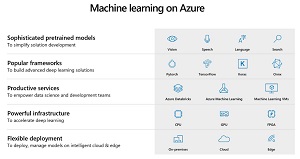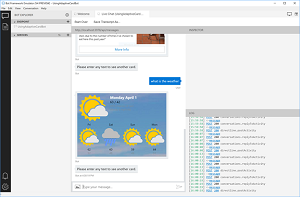News
Next-Gen AI, Quantum Computing Updates Highlight Microsoft Ignite Conference
Microsoft is arming developers with next-generation tools and looking to the future at its Ignite conference, which runs through Friday in Orlando.
While the show largely targets IT pros and users, it also features plenty of developer-related content, which this year is highlighted by cutting-edge artificial intelligence (AI) and quantum computing announcements.
Here's a recap of what's been announced so far in those arenas:
Azure Machine Learning
Microsoft's cloud-based Azure Machine Learning service is previewing a new feature that provides automated ML capabilities for AI development tasks such as data transformation, model selection and hyperparameter tuning.
"Automated machine learning is at the forefront of Microsoft’s push to make Azure Machine Learning an end-to-end solution for anyone who wants to build and train models that make predictions from data, and then deploy them anywhere -- in the cloud, on premises or at the edge," Microsoft said in a blog post yesterday (Sept. 24).
 [Click on image for larger view.] Azure Machine Learning (source: Microsoft).
[Click on image for larger view.] Azure Machine Learning (source: Microsoft).
The company also announced a new Python SDK to let developers access Azure Machine Learning from a Python development environment, such as Visual Studio Code, Visual Studio, PyCharm, Azure Databricks notebooks or Jupyter notebooks. The Python programming language is skyrocketing in popularity, in part because of its increased use in data science and advanced analytics scenarios.
“We heard users wanted to use any tool they wanted, they wanted to use any framework, and so we re-thought about how we should deliver Azure Machine Learning to those users,” said Eric Boyd, corporate vice president, AI Platform. “We have come back with a Python SDK that lights up a number of different features.” Those include distributed deep learning, and field programmable gate arrays (FPGAs), used for high-speed image classification and recognition scenarios in the Azure cloud. Supported models for training data include ResNet 50, ResNet 152, VGG-16, SSD-VGG and DenseNet-121.
Also announced were new model management capabilities to help developers manage Dockerized models using models and an images registry that integrate into continuous integration (CI/CD) pipelines.
Azure Cognitive Services
Another cloud-based AI offering, Azure Cognitive Services, received its own update. The service helps developers use intelligent algorithms in apps, Web sites and bots in order to leverage natural methods of communication -- such as speech -- for understanding and interpreting user interactions.
"Azure Cognitive Services allow you to infuse your apps with powerful pre-trained models that can help with vision, speech, language and Web search," Microsoft's Boyd said in a blog post. "We have over 1.2 million developers using Cognitive Services to deliver AI-led experiences to their users."
To help those developers out even further, Microsoft announced the general availability of its speech service, which combines into one offering several individual capabilities, including:
-
Speech to Text
-
Text to Speech
-
Custom Speech
-
Speech Translation
-
Custom Voice
Additionally, other APIs that will become available in US Government regions in the next few weeks include:
Azure Bot Service
Microsoft's Azure Bot Service, which helps developers build, connect, deploy and manage intelligent agents to interact naturally with users from within apps or Web sites, also received some attention at Ignite.
 [Click on image for larger view.] Bot Framework Emulator (source: Microsoft).
[Click on image for larger view.] Bot Framework Emulator (source: Microsoft).
"Today, I’m announcing the general availability of Microsoft Bot Framework SDK V4 for C# and JavaScript, and a set of cross-platform command line tools for managing bots, bots’ services, and channels," said Lili Cheng corporate VP, Artificial Intelligence and Research Group, in a blog post. "The Bot Framework Emulator V4 has a new version but remains in preview. With this release, Microsoft Bot Framework and Azure Bot Service offer a comprehensive experience to build, test, and publish intelligent enterprise-grade bots on Azure Bot Service."
Cortana
Developing enterprise projects that leverage functionality provided by Microsoft's personal intelligent assistant, Cortana, will be getting better thanks to a new Cortana Skills Kit for Enterprise.
That new development platform, currently available only by invitation, will help developers create company-specific skills for Cortana, using known and trusted tools.
“At heart, we are about providing valuable assistance to users throughout their day," said Javier Soltero, the Microsoft corporate vice president in charge of Cortana, in a blog post authored by Microsoft's John Roach. "That assistance takes different forms depending on where the users are in their day and what they are trying to do. It’s important for enterprises to be able to enable their workforces to use Cortana to perform company-specific tasks.”
The Cortana Skills Kit for Enterprise ties in to multiple AI services mentioned above, as it's powered by the Azure Bot Service and also leverages the Language Understanding capabilities of Azure Cognitive Services.
Microsoft didn't reveal specific skills to be targeted with the kit.
Quantum Computing
The bleeding-edge quantum computing space, though difficult to explain and reportedly years away from practical applications, was identified by Microsoft CEO Satya Nadella as one three primary areas of focus for the company, along with AI and mixed reality. Microsoft late last year unveiled a Quantum Development Kit to help developers get started with the mysterious technology, and Jerry Nixon, a developer evangelist, provided more details on quantum computing in July.
And today, at Ignite, Microsoft announced an upcoming update to that Quantum Development Kit.
The Microsoft Quantum Team said the update "will include a new chemical simulation library developed in collaboration with Pacific Northwest National Laboratory (PNNL), a leader in both chemistry and data analytics. The library can be used in conjunction with NWChem, an open source, high-performance computational chemistry tool funded by the U.S. Department of Energy’s Office of Science. Together, the chemistry library and NWChem will help enable quantum solutions and allow researchers and developers a higher-level of study and discovery as they tackle today’s computationally complex chemistry problems."
Microsoft said the kit update will also provide modern capabilities of language design to programming with its Q# programming language. These reportedly include support for IntelliSense in the Visual Studio IDE as well as new language capabilities specifically valuable for quantum computing. The company promised more information later this year.
Stay tuned for more developer news coming from Ignite 2018. Our sister publication, RedmondMag.com, provided a wrap-up of yesterday's general availability announcements here, along with other news about SQL Server 2019, Windows Server 2019 and more.
About the Author
David Ramel is an editor and writer at Converge 360.